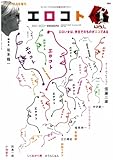I. Clothing & Customs
Aomori is renowned throughout Greater Japan for its Apples, and indeed, the first Sight to greet your Correspondent as he stepped off the Bus was a great Statue, depicting a Man & his Mate raising Apples to Heaven, as though offering to exchange them for Passage to somewhere warmer.
Indeed, to protect their Selves from the bitter Cold, the Natives of Aomori employ all Manner of curious Garments, such as the Sweater, which is like a thick woolen tunic, & the Tracksuit-Pant, which is worn under a short, pleated, navy-blue Skirt while riding one's Bi-Cycle.
Sustenance can be obtained from conveniently located Stores selling outlandish Buns impregnated with various Jams, Sauces & Meat Products. The Fruits of the local Apple Trees are primarily sold in Packages wrapped in fine Japanese Paper and intended as Presents for some one other than the Buyer -- it is my Belief that these, too, are primarily used as Bribes allowing the Natives to flee to Places where the Sun can be seen.
II. Wedding Rituals
The first Ceremony on the Aomorian Wedding Day takes place in a large, open Hall, consecrated to a God who, they say, is the Source from which all Love, Kindness, &c. flow. It is officiated over by an aged Man, styled a Shin-Pu or "Holy Father", who leads the Assembled in barbaric Hymns which consist of shameless Flattery & patently excessive Praise; obvious & obsequious attempts to curry their distant God's Favours, they are accompanied by the sounds of Air propelled through divers Pipes by means of Keys pressed in complex Combinations by an old Woman, possibly the Shin-Pu's wife.
The Bride & Groom each vow to protect the other from Ailments & Poverty, and then step outside to be showered by the Guests with Petals, a crude magic designed to induce Fertility which, your Correspondent was informed, is derived from certain Practices current among the Western Tribes.

The Aomorian Savage leads an idyllic Life of Liquor & Song, unconstrained by modern Laws or Copy-Rights
All Participants & Witnesses then move to a great Banquet Hall at which Fruit-Cake & Raw Fish are consumed while the Groom's Superior at his place of Business delivers a long & disagreeable Speech. Certain Guests are compelled to perform Songs in Honour of the new Couple; indeed, the Author was pressed into Service as part of a Duo singing a simplistic Chant celebrating Transvestitism and entitled Ob-la-di, Ob-la-da.
When the Banquet is complete, the most youthful & vigorous of the Guests proceed to yet another location at which Foodstuffs are served but largely ignored in favour of Intoxicating Beverages. Here, too, are Songs sung, and the remaining unmarried Youths of the village attempt to seduce each other in the Spanish Style, which is to say, until the last individual has lost consciousness.
III. Crafts & Technology; a Link with the South?
The following Morning, your Correspondent visited a local Warehouse which a notorious pair of Artists, one born in Aomori but both now resident in the South, had conquered by Force and filled with whimsical Sketches & Paintings of small, deformed Children of a menacing Air. Lithography was strictly prohibited, possibly due to lingering Beliefs that the Artist's Soul would be stolen, but commemorative Pamphlets & Books were available in exchange for Money at a Stall that had been erected nearby.
Other Vendors in the area sold the aforementioned Sweaters, along with Books (including an unusual Preponderance of those in the French tongue), garishly adorned Electric Guitars, & Hamburgers.
One store was filled with plastic Mannequins which, I am told, are highly prized as erotic Totems by a certain local Tribe, who were themselves visible in a Corner playing a complex Card Game. Their idiosyncratic Dress & Speech leads me to believe this Tribe to be related to the elusive Old Akihabarans, and invite interested Scholars who wish to investigate this Issue further to contact me via the Publisher.



![[No-sword]](http://no-sword.jp/images/site/no-sword_banner.jpg)










